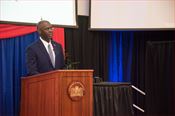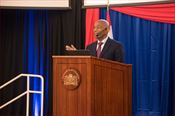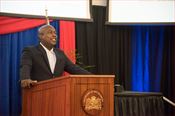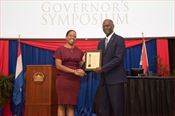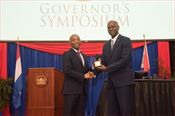in deze afdeling
De Gouverneur Toespraken
Energy Transition From Fossil Fuels To Solar, What Are We Waiting For?
Opening Address
By
The Governor of Sint Maarten
His Excellency drs. Eugene B. Holiday
Delivered at the
Ninth Annual Governor’s Symposium 2022.
June 27, 2022
Cupercoy, Sint Maarten
Ladies and Gentlemen,
Good Morning,
I bid you, also on behalf of Marie-Louise, a warm welcome to the ninth annual Governor’s Symposium. This after a two-year interruption due to the COVID-19 pandemic.
It gives me great pleasure to see each of you in the audience and to greet our online participants.
In particular I acknowledge the presence of the Deputy Prime-Minister and Minister of VROMI, Mr. Egbert Doran who will be addressing you today as well as the Chairlady of Parliament Mrs. Grisha Heyliger-Martin, and the Dean of AUC Dr. Delgado.
I am in particular pleased to recognize and extend a special welcome to my honored guests and Caribbean neighbors: our keynote speaker, Dr. Hyginus Leon, President of the Caribbean Development Bank Headquartered in Barbados and our featured speaker Mr. David Leonce, from Saba Electric Company in Saba. Your presence at this Governor’s Symposium is highly valued. And I also acknowledge our local energy sector operators and panelists for today: Dr. Sharine Daniel from utility company GEBE, Robert-Jan James from petroleum company Sol, and Mr. Werner van de Zilver from energy solutions company Dynaf.
Ladies and Gentlemen,
Since this symposium’s inception we have discussed a variety of strategic policy issues ranging: from National Heritage to Education, from Good Governance to Sustainable Development and Recovery, and from Digital transformation to Climate Change. The subject of this year’s Symposium is Energy, with a focus on: Energy Transition in the Caribbean – Challenges and Opportunities. Last week someone asked me: “Why energy transition?”
The Caribbean region in general, and Sint Maarten is no exception, continue to face the challenges of a recurring need to recover from macro-economic imbalances caused by repeated external shocks. As a people we must therefore pursue policy strategies that reduce our vulnerability to external shocks, increase our resiliency and secure our future.
It is particularly important that we pursue such strategies, in areas which constitute essential necessities for our daily lives. One of those essential necessities is energy. It is evident that electricity plays a vital role in our daily lives. It is an essential input in our food, our water production, our health care system, and our internet systems to name a few. In 2021 we consumed over 310 million Kilowatt hours of electricity. Our utility company depends entirely on the importation of oil for the generation of electricity. And that does not include the importation of oil to meet our transportation needs. We are as a result heavily dependent on oil imports and the need to generate foreign exchange to pay for our essential necessities. Energy transition offers a strategic opportunity to reduce our dependency on oil imports, improve our energy security and strengthen the sustainability of our economy.
At its core, energy transition is the transformation of the fossil fuel dependent global energy sector towards renewable energy sources, such as, the wind, the sea, and the sun.
The current fossil-fuel based energy sector is the largest contributor to human-based greenhouse gas emissions. It is thus a major contributor to the ongoing Climate Change crisis. Climate Change through sea-level rise and more severe hurricanes poses an existential threat to our region. Sea-level rise, for example, places low lying areas such as Philipsburg, Simpson bay and others at risk of being submerged by the sea. And increasingly stronger hurricanes, such as Irma and Maria in 2017, causes the devastation of infrastructure and production capacity. The loss of production capacity and thus of foreign exchange generating capacity has been exacerbated by the COVID-19 pandemic. In addition, we also see the purchasing power of our reduced foreign exchange revenues eroded by high inflation. High inflation caused by COVID-19 supply chain disturbances and in large part by the recent geo-political induced strong increase in oil prices.
Considering these impacts, the key questions at this symposium are:
1) First, will the implementation of an energy transition policy help to address these issues;
2) Second, what are the implementation challenges as well as the technological, expertise or financial constraints of energy transition; and
3) Third, what are the real opportunities in terms of benefits for our people.
A global energy shift to renewables offers the opportunity to limit climate change and its impacts. It is therefore in our interest to do our part, as minuscule as its global greenhouse gas emission effect may be, to help and encourage energy transition. Realization of energy transition in Sint Maarten offers the opportunity for us to reduce our dependency on oil imports, to lessen the impact of the fuel clause in our electricity bill and to improve the sustainability of our economy. And I am convinced that with our creativity we can bring about the changes necessary to achieve this.
Ladies and Gentlemen,
In closing, in 1995 hurricane Luis devastated our island and our utilities infrastructure. In response, NV GEBE worked with Government on the strategic decision to place the distribution grid underground to provide a more robust network and reliable power supply. That strategic decision and investment paid significant dividends in the aftermath of hurricane Irma. I am please to have been part of that process. Today, we are at a another more critical crossroad. One where we - must decide on reengineering and transforming our energy production and distribution network to cushion us against oil market shocks. Looking ahead, I believe that it is imperative that households, businesses, GEBE and Government work together and with the region to refine and execute existing or new energy transition plans. Plans based on a regulated phased transition from oil to renewables such as wind, water or solar. Considering the abundance of solar energy in our region and given the technologic advancements, I wish to leave you with the following thought:
We live in the solar system
surrounded by solar energy waiting for us to harness it.
What are we waiting for?
I therefore look forward to hearing the views of the minister, of our keynote speaker, of our featured speaker and of our panelist as well as your questions on this relevant topic for Sint Maarten and the region.
With that I hereby declare this symposium open and wish you an enjoyable and fruitful symposium.
Thank you, God bless you and May God bless Sint Maarten and protect its coast!

